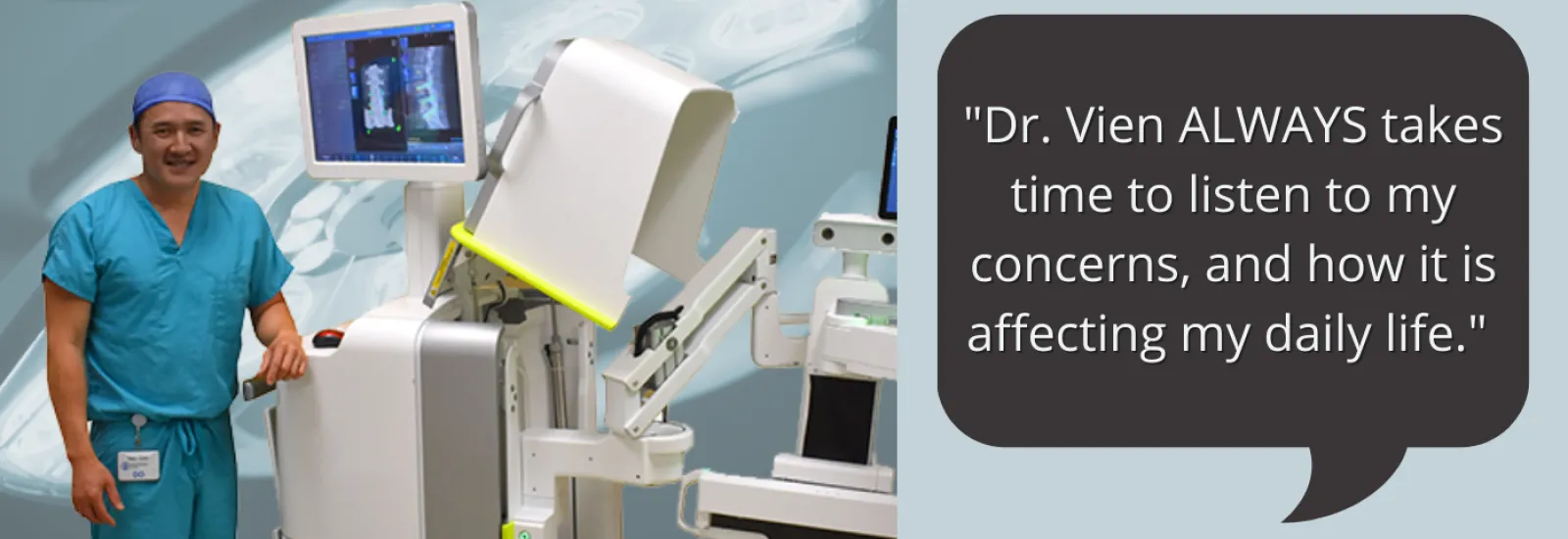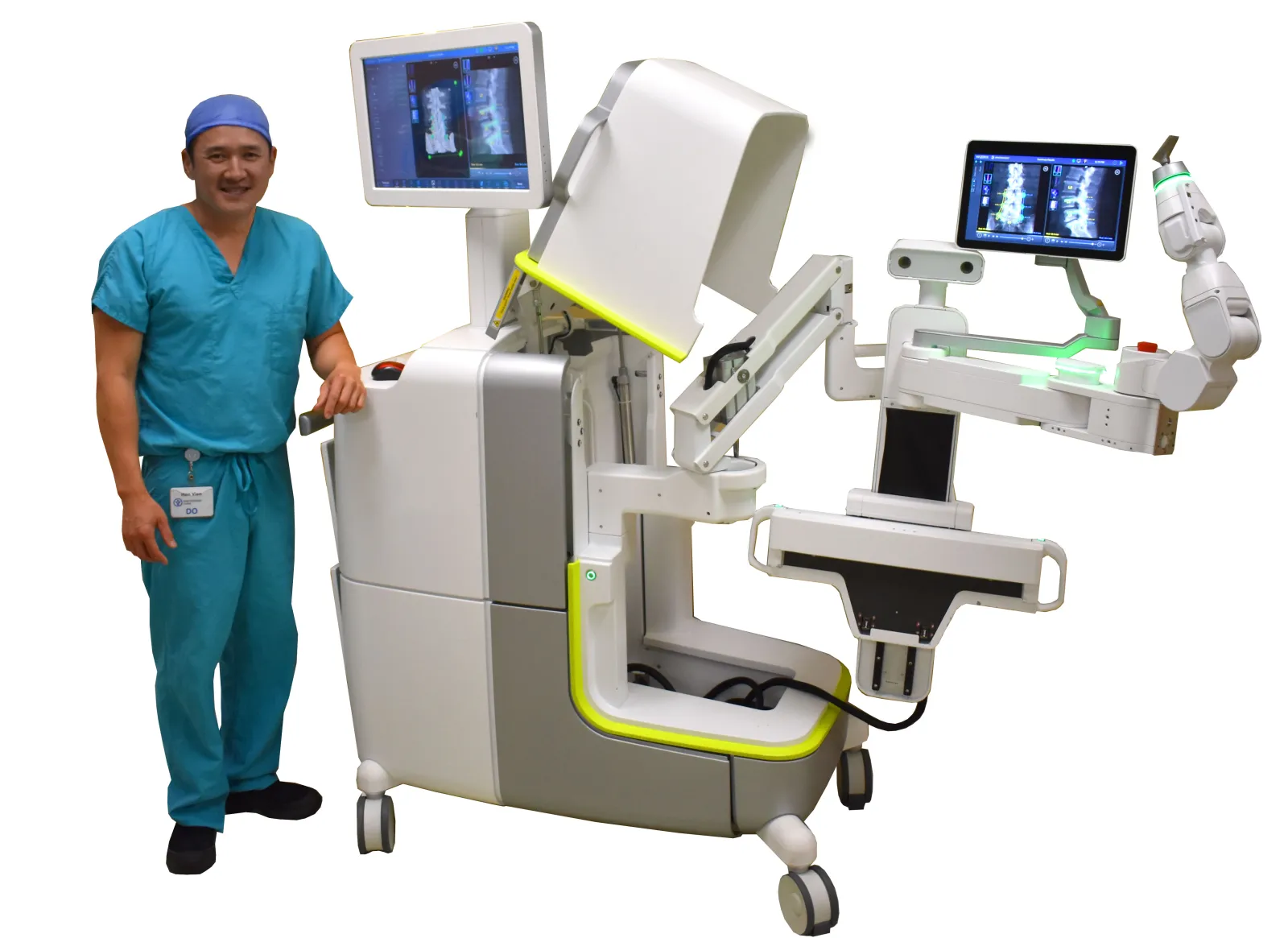
A surgeon who is truly 'right beside you:' Dr. Hon Vien’s perspective on minimally invasive and robotic spine surgery
If you're dealing
with chronic back pain related to an injury, obesity, or general wear and tear,
exploring your treatment options is one of the best things you can do. There
are a broad range of approaches in treating back pain, and working with a
specialist is the best way for you to design a course of treatment that can help you find relief and get back
to the things you love doing.
That's why we sat down with Dr. Hon Vien, a specialist in robotic and minimally invasive spine surgery to learn about the options. Only 15% of spine surgeons in the United States are qualified in minimally invasive spine surgery, and Dr. Vien is among them. He is also just one of a few surgeons who have completed more than 1,000 surgeries assisted by Mazor robotics technology, a significant achievement in quality orthopedic care.
Dr. Vien also has firsthand knowledge of what it feels like to experience debilitating back pain. Before he was a spine surgeon, Dr. Vien was a physical therapist. He experienced a work-related injury that led to intense sciatic pain that affected his back and left leg.
"I tried all types of treatment, including physical therapy, medications, bracing, even injections but my pain did not go away," he said.
Eventually, Dr. Vien had spine surgery to correct the issue and woke up without pain. This life-changing experience led him to pursue a career as a spine surgeon.
"I understand the type of pain my patients feel," he said. "I felt the same type of pain myself with my sciatica, and I know how debilitating it can be."
This firsthand experience helps him to relate to his patients. He understands not only the debilitating pain but also the fears, worries, and concerns a patient might face in the path to recovery.

What can I expect at my first orthopedic visit?
Your path to recovery often begins with your first trip to see your orthopedic specialist. At your first appointment, you'll get to meet your care team. This could include your orthopedic doctor/surgeon, a physician's assistant, and nursing staff.
Jay Hartman, physician assistant, is deeply involved in understanding and providing care to Dr. Vien's patients. As an orthopedic specialist, he's a great resource in understanding and managing your orthopedic care.
After you meet your care team, your doctor begins working to understand your symptoms.
"During your first visit, the most
important thing to me is to get to know you personally and better understand
what's happening to you," Dr. Vien said. "I want to know if you're experiencing any back pain, arm
pain, or leg pain."
Your doctor will then review any imaging you've had of the structures in your body, such as an X-ray or MRI. These tests will help your doctor to better understand the causes of your pain. At this point, your doctor is often able to diagnose the cause of your pain and will work with you to develop a treatment plan.
It's important your doctor takes time to help you understand your diagnosis and treatment options. To Dr. Vien, this is one of the most important aspects of his practice.
"I'll take the time to explain your diagnosis in detail, the
finding in your imagery, and your treatment options," he said. "If your pain requires
surgery, I'll go over exactly what will be done during the surgical procedure. That
way you have a complete understanding of what to expect pre-op, during the
surgery, and into your recovery."
What is
minimally invasive spine surgery?
When compared
with traditional surgical techniques, minimally invasive spine surgery, also called MISS, can offer a patient many benefits. As a philosophy, minimally invasive spine surgery is designed to
reduce soft tissue damage, which means recovery is faster. According to Dr.
Vien, "Less
soft tissue damage means less pain, fewer narcotics for pain management, and a
shorter hospitalization. Sometimes it is even possible to perform MISS as an
outpatient procedure, which means you get to go home the same day."
What are the
benefits of robotic spine surgery?
Like any surgical technique, robotic surgery is not for all patients. Only your orthopedic surgeon can help you decide if it's the right choice for you. But if you're a candidate for robotic spine surgery, this method can improve the accuracy of your doctor's work. For example, MAZOR robotic spine surgery improves the accuracy of screw placement from about 90% to 99%. What does this mean for the patient?
"Robotics are very safe and very
effective," Dr. Vien said. "Patients whose surgeon uses robotic techniques during spine
fusion benefit from precisely placed screws. This means a lower likelihood of
pain after surgery and a greater likelihood of surgical success."
Spine surgery
at Reid Health
For more information about spine surgery at Reid Health, visit reidhealth.org/spine.

